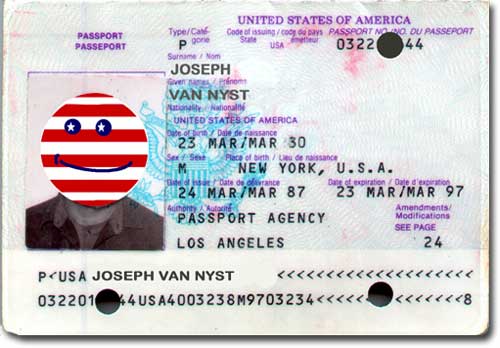
©2005 UrbisMedia
Americans abroad are pretty much the people they are at home, often more so. People don’t leave there little idiosyncrasies, quirks, prejudices and predispositions at the boarding gate at O’Hare or LAX. These characteristics come right along with them, and sometimes stand in greater relief against foreign backdrops.
Owing to their great variety Americans can seem more difficult to caricature as travelers than those from other countries. Japanese seem to always be photographing one another in front of tourist sites; the French are judgmental about the cuisines of other nations; Australians are often “on walkabout” for months at a time; waiters deride the British for their parsimonious tipping. Every people or culture seems to have some little quirk or ethnic characteristic that seems to be more exposed in foreign light.
Owing to our much-cherished American individualism, which, combined with the ethnic menagerie that we are, Americans can be more difficult to generalize about, even to ourselves. But within that menagerie there appear to me some distinct “subspecies” of American travelers, not all of them necessarily good ambassadors for the rest of us.;
Those profiled below are a few of the more prominent “fellow Americans” one might encounter abroad, and the traveling reader may recollect as a seatmate or roommate. They are composites and their names have been changed to protect the author. Maybe you’ve encountered a few of them on planes, tour coaches, or cruise ships. And, just maybe you’ll recognize one of them next time you look at your passport photo. But whoever they were they likely confirmed Mark Twain’s sagacious observation when he said he discovered that “… there ain’t no surer way to find out whether you like people or hate them than to travel with them.”
Here are the first two:
Bill Ablehours’ wife Betty threatened to divorce him if he didn’t come along on this tour. Only the prospect of coughing up community property and alimony convinced him to go along, grumping and griping all the way.
“Time is money” Bill will be heard to say more than once on this trip, and the idea that he is away from the office, “wasting my time” among these “lazy Europeans who are always on vacation,” galls him to no end. He could be home increasing his “networth” selling life insurance and nearly boring people into collecting on it early, but he’s being dragged around the Roman Forum about which he fulminates: “this place is so dangerous to walk in that it’s ten thousand personal injury suits waiting to happen” (which several of his tourmates privately wish he would demonstrate).
If we have traveled enough we’ve all traveled with a Bill Ablehours. He moves about in a hermetic bubble of self-interest, immune to seeing that there is much of a world beyond his narrow vision. Bill is the guy who, when you went back to your fortieth high school reunion seemed to have been in social hibernation since the senior prom. He only pretends to remember you because you look like a good candidate for a whole life policy.
By day five of the tour, the mere presence of Bill is likely to generate an epidemic of Attention Deficit Disorder. One of the few remaining persons who will listen to him expound on the pros and cons of term life and whole life and is Hans, the German bus driver, who has nine words of English and is vainly expecting a fat tip from Bill at the end of the trip. Bill will stiff him good, after all the advice he gave him on no-load mutual funds is worth much more than a measly tip.
If Bill is going to form a bond with anyone on this trip it is likely to be with Joe Van Nyst. They might well first meet in the hotel bar, where Joe can be overheard telling the bartender how they make his drink back in Dallas; that is, “the American way.” In fact, Joe can’t find anything anywhere in the world that is done better, or even as well, as in the “good ole US of A”.
At home Joe regards his own government as nothing more than an interfering, tax-sucking, Big Brother; but over here “they’re all socialists, commies, and fascists” who would still be back in the Stone Age where we bombed them if it wasn’t for American money and ingenuity. For Joe, the Renaissance is merely the name of a hotel chain, and the Enlightenment is when Europeans got electric lighting, for which they should be thankful to American Thomas Edison. Joe also has the annoying tendency to expound on these matters to waiters, desk clerks, chambermaids, and others who would risk losing their jobs if they called him the bigoted bore he really is. About all they can do when Joe raises his index finger and says “America is No. 1,” is to wait until his back is turned and return the gesture, employing a different finger.
___________________________________
©2005, James A. Clapp (UrbisMedia Ltd. Pub. 1.11.2005)
